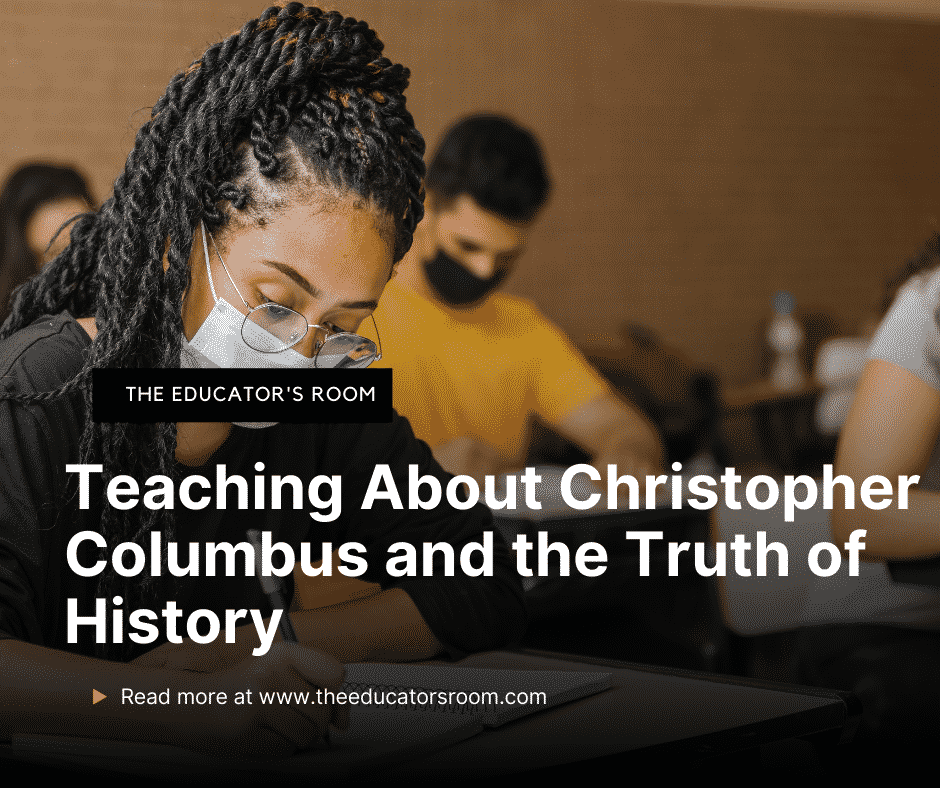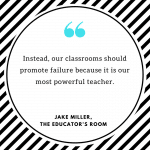Once again, Columbus Day has rolled around, and teachers, especially History teachers, have an opportunity to set the record straight. A great article by TER’s Mike Dunn today talks about teaching Columbus and is rich with ideas and resources. I am writing today not about how to teach it but why it is essential that we teachers be at the forefront of telling the truth of history.
You have probably seen the news the last few weeks about the Colorado Board of Education and its attempts to “exceptionalize” AP US History and other history curricula in the state. Teachers and students alike carried out protests and civil disobedience to draw attention to the irony of a school board insisting that children not be taught “civil disorder.” The Board argued rather that patriotism and the free-enterprise system should be focused on as America’s great gifts to the world. Somewhere lost in the Board’s argument was that this country was founded because people dared to engage in civil disorder, and our system of “free enterprise” was built on the backs of slaves (and the South is not the only region guilty of this, the entire country benefited and made its first major economic strides because of slavery). The same kind of “exceptionalism” thinking is what has guided the story we all learn as children about Columbus sailing to the Americas and “discovering” our country. We now are all much more versed in the reality of what Columbus and his men actually brought to the Americas (violence, death, disease, slavery, genocide) and what they took. We here in the Pacific Northwest have other European explorers who landed on our shores and almost immediately engaged in conflict with the indigenous people who’d already been living here for thousands of years. They are not pretty stories, but they certainly don’t have to be tied up in bows to be presented to our students.
“American Exceptionalism” is an idea similar to “Manifest Destiny” – it is a contrived idea that somehow the United States is special amongst all the lands of the earth and that we have all the riches and power that we have achieved simply because we are better, smarter, and darn it, we deserve it! The idea is that we are uniquely free and democratic, and our kind of freedom is the truly best kind of freedom. We are more democratic and more accessible, of course, because of free enterprise capitalism. You can probably begin to see the connection between American Exceptionalism and Manifest Destiny. Both ignore the reality of our history, how we became a country, and how we can be better if we learn from our history rather than whitewash it. And by “whitewash,” I mean precisely that because the white European influence on this continent was the main focus of the history curriculum for years. In the last decades, we’ve made great strides in trying to undo some of that nationalistic/European focus, but we still struggle against those that prefer we pretend our history was something it was not. And every Columbus Day is an example of that struggle.
Thom Hartmann wrote an article years ago laying out the reality of Columbus. I used to share excerpts of that article with my high school seniors, and they would ask why they did not know the facts of Columbus and his crews and what they wrought on Hispanolia and its people until that point. Well, it makes sense to temper what you reveal to students based on their age. But that does not mean we need to lie to younger children. It does them no good to whitewash the stories of history for them when they are young – they will not learn to value the lessons of history that way. Neither do we need to subject young children to ideas they have yet to grasp. But there is definitely a middle way, and it’s important because it not only honors the truth of history but also honors our students. Teaching the reality of how Columbus was the most famous European Explorer to happen upon the American continent (but of course, not the first) can be an honest lesson in how he was the vanguard of European colonization, what happened to the people who already lived here, and how humans who believe they are “exceptional” treat others. History is valuable not because we can tell incredible stories about how amazing we are – history is valuable because we can teach students how to learn from the past. History is not about puffing up our past; it is about understanding how to go better into our future.
We must also give students credit for their innate wisdom. Children, even at young ages, can understand that people are not all good and not all bad (Thomas Jefferson?). They can understand that decisions were made by American leaders that hurt others (Andrew Jackson, anyone?). They can understand that sometimes when laws are unjust, it is important to stand up against them (Samuel Adams, Benjamin Franklin, Martin Luther King, Jr.?). We definitely are a unique country in the history of the earth because we are the first country founded on ideas and consensus. But the country that was founded initially left out whole swaths of people from being included in those ideas and that consensus, and even deliberately enslaved entire populations within our Constitution. Those early decisions set a pattern of discrimination and white privilege that we still must untangle ourselves from. It does not take away the value of the ideas to also acknowledge the way those ideas were denied to people even within this country. What we can also teach us that we have progressed. We had sometimes learned from our past (when we paid attention to it), and we have made new and different decisions. We stumble, and we struggle, and we certainly have not got that “freedom for all” thing down quite yet. But understanding the truth of history gives us the ability to continue to fight for those ideas for everyone.
Our students don’t become better citizens when they grow up in ignorance of the reality of our history. We don’t have to pretend we are special to make history itself interesting or important. It is in teaching and honoring the mistakes and the failures along with the successes that give us and our students the ability to think about decisions being made now critically and in the future. And that critical thinking is what will sustain this country going forward and engage the population as citizens. We don’t need to lie or pretend that Columbus was a great explorer or that he “discovered” America in order to teach European exploration and arrival in the Americas. We don’t somehow displace the history of the U.S. by teaching the plight of the Indigenous Peoples and their fate at the hands of those same European arrivals or at the hands of leaders of this country. The pattern that played out in the Americas played out across the world, throughout history in the conquering and colonization by countries and kingdoms of other countries and kingdoms.
History is no less valuable if it doesn’t make us exceptional. The lesson of Columbus is no less valuable if he isn’t a jolly sailor who brought comfy blankets to the natives. The reality of what one of our most grievous errors — the perpetuation of slavery, segregation, and discrimination — has done to our country is far more valuable a lesson than pretending that Abraham Lincoln freed the slaves and we all voluntarily lived happily ever after. We want our students to grow into critically thinking, discerning, and compassionate people. Teaching the truth of history is what will lead them there.





